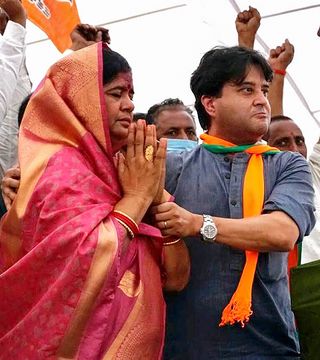Despite her two-decade long political career, Imarti Devi, 45, minister for women and child development in Madhya Pradesh, was little known outside the state. But that changed last week. The veil of her sari intact on her head, vermillion smeared on the forehead and often wiping tears, she hogged news prime time after national channels latched on to the allegations of former chief minister Kamal Nath calling her an ‘item’ at an election meeting in Dabra on October 18.
Within a few hours, however, Devi shed the victim’s image and started making equally obnoxious comments on Nath. She called him ‘an outsider from Bengal who does not have manners’, a madman, a drunkard and a luchha lafanga (loafer) and went on to say that his mother and sister might be ‘items from Bengal’. A day after Nath gave his explanation to the Election Commission’s notice on the ‘item’ jibe, the Congress lodged a complaint against Devi. The Election Commission sent her a notice, too, to explain her comments.
The crucial bypolls to 28 assembly seats have seen probably the most degenerate campaign in the electoral history of Madhya Pradesh, and the Kamal Nath-Imarti Devi issue was just one of the many bitter exchanges. Leaders of both the BJP and the Congress have engaged in actions and language that have left a lingering bad taste. Starting from gaddar (betrayer) and bikau (on sale) to dalal (agent) and kapat nath (one who deceives), the language has touched rock bottom. Then there have been plenty of videos of candidates distributing money and clothes and threatening voters—at times with guns.
Madhya Pradesh is used to mild and balanced political discourse owing to stable governments. “The developments that warranted these bypolls in the first place are unprecedented for Madhya Pradesh,” said political commentator Manish Dixit. “There was drama and bitterness and allegations and counter allegations as so many MLAs resigned and joined the rival party. It was natural for the discourse to get acrimonious after that, but that it will sink to such low level was not expected.”
And, it turned out to be a tough election for both parties. Though the ruling BJP has a numerical advantage as it requires only eight seats to get to the majority mark of 115, it faces internal disquiet and anger of voters against the turncoats. The Congress will have to win almost all the seats to secure a majority. Given that those who left the party also took away a chunk of supporters and with the lack of popular faces in the campaign other than Kamal Nath’s, getting back to power looks like a long shot for the party.
The bypolls have been expected ever since 22 legislators resigned from the Congress and joined the BJP in March. A lot has already been said and done by the parties in the form of informal campaigning, and both seem to have run out of solid campaign topics. Things naturally veered towards personal attacks and allegations.
Political analyst Rashid Kidwai said the attempt to take the discourse towards trivialities and controversies seemed deliberate. “Both the parties have no substantial things to talk about in the present circumstances, especially to explain to the voters as to why the bypolls were required. The Congress has no excuse to offer as it failed to keep its own flock in order and the BJP cannot probably accept that it engineered the collapse of the government. So, both are engaging in frivolous talk and trying to divert the discourse,”he said.
Voters also seem to have figured it out. Dr Chandan Singh Lodhi of Alampur village in Gairatganj, which is part of Sanchi constituency, said the controversies surrounding leaders’ cheap talk and videos were not decisive factors. “For a common voter, the important things are confidence in the candidate and the party’s willingness for local development,” he said.
The Congress and the BJP blame each other for the situation. “The Congress started the personal attacks and trivial talk so that they do not have to be accountable for their pathetic performance while in government. They have insulted the chief minister, the people of the state, stalwarts like Tata, women and dalits. The party cadre and leaders are completely caught in internal politics and just trying to deceive and mislead the people,” said the BJP’s state president Vishnu Dutt Sharma.
Congress spokesperson K.K. Mishra, however, said his party was always for modesty of language in public discourse. “The way the BJP diverted from real issues and initiated the low-level language discourse displays its frustration, fear of the impending loss in all seats and idleness,” he said. “They do not have anything to show on progress and development and thus are stuck on frivolousness. The voters of the state are quite aware and even if they might not be displaying their ideological commitment, they certainly are watching and understanding the happenings.”



